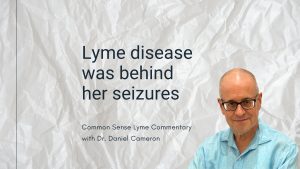Call for your appointment today 914-666-4665 | Mt. Kisco, New York

In the article “Failure of an Approximately Six Week Course of Tafenoquine to Completely Eradicate Babesia microti Infection in an Immunocompromised Patient,” Prasad and Wormser describe a chronic relapsing Babesia infection in an elderly woman.¹
The 74-year-old patient was admitted to the hospital in August 2021 with a 2-day history of fatigue and fevers. She was immunocompromised and had a history of diffuse large B-cell lymphoma treated with chemotherapy, polymyalgia rheumatica treated with low dose steroids (prednisone 5 mg/day, plus a short trial of a tocilizumab [a disease-modifying antirheumatic drug]), and cold autoimmune hemolytic anemia.
“A peripheral blood smear was positive for B. microti (0.2% parasitemia),” according to the authors. Her Hgb dropped as low as 6.5 g/dl. She received 10 units of blood.
She was initially treated with a 7-day course of azithromycin and atovaquone. She was also prescribed steroids. Her parasitemia resolved.
However, the woman developed recurrent fatigue and fever with a recurrence of parasitemia (0.3%).
The clinician planned to retreat her with a 6-week course of azithromycin and atovaquone, but added clindamycin due to a persistent parasitemia and fatigue. She was subsequently switched to quinine plus oral clindamycin.
READ MORE: Tafenoquine: Treatment for relapsing Babesia
“This antiparasitic drug regimen was discontinued on 20 January 2022, because she developed symptoms consistent with cinchonism (hearing loss, vertigo, tinnitus),” wrote the authors.
Cinchonism resolved after stopping her quinine plus oral clindamycin.
“She then developed severe fatigue and subjective fevers on 22 February 2022 with a recurrence of the babesia parasitemia (<0.1%), along with evidence of worsening hemolysis,” wrote the authors.
She was retreated with oral clindamycin along with a reduced dose of quinine. Her parasitemia continued.
The woman was then prescribed off label tafenoquine, as she tested negative for glucose-6-phospate dehydrogenase deficiency.
“She was started on oral tafenoquine 200 mg once a day for 3 days (loading dose) from 7-9 March 2022, and then 200 mg once per week thereafter starting on 16 March 2022,” wrote the authors. The Hgb rose from 6.5 g/dl to 13.3 g/dL without transfusions.
Tafenoquine was stopped after 6 weeks due to neutropenia. “The neutrophil count reached a nadir level of 325 cells/uL,” wrote the authors.
The woman’s severe fatigue, parasitemia (<0.1%), and hemolysis recurred.
“She was started on a new drug regimen of oral azithromycin 1000 mg once daily, atovaquone liquid suspension 750 mg once daily, and four Malarone® tablets once daily (each tablet consisting of 250 mg atovaquone plus 100 mg of proguanil) on 2 June 2022,” wrote the authors.
By the end of June, PCR testing for Babesia was negative.
However, “It was planned to continue treatment for at least 12 weeks,” wrote the authors, “and even to consider chronic suppressive therapy going forward.”
Prasad et al. described two previous cases where tafenoquine was effective for Babesia.
The authors concluded:
- “Therefore, based on available data, tafenoquine as a single agent may, or may not, be curative of B. microti infection in a chronically immunocompromised patient.”
- “Clearly, more clinical studies and more studies conducted in animal models are needed to optimize the use of tafenoquine in order to prevent a relapse of B. microti infection in chronically immunocompromised patients with babesiosis when the drug is discontinued.”
Related Articles:
Prolonged Babesia infection in patient with asplenia
Congenital transmission of Babesia, diagnosed in twin at 5 weeks
References:
- Prasad, P.J. and G.P. Wormser, Failure of an Approximately Six Week Course of Tafenoquine to Completely Eradicate Babesia microti Infection in an Immunocompromised Patient. Pathogens, 2022. 11(9).




Dr. Cameron, I was just wondering if you’ve ever had success with treating Babesia with Alinia (nitazoxanide)? Thank you so very much for your time.
I don’t have enough experience to guide you.
For Babesia infection, treatment protocol using Ciprofloxacin can clear the parasite. 250mg x 3 times/day for five days can be curative. Cipro is good for mycoplasma infection too.
I have not seen any published evidence that ciprofloxacin is effective for Babesia.
I was diagnosed with babeesia in July. Still feel awful. Was given 10 days of azithromyicin and Avitoquoine. Seeing a Lyme dr. But he keeps giving me supplements that don’t help.
I have patients who have done well if their Babesia was treated long or retreated.
There are plenty of studies. Read the text carefully and start using fluoroquinolones (Cipro) for Babesia treatment. Curative protocol and can clear the infection really fast, one week treatment and the infection is cured, no symptoms and huge improvement.
https://www.ncbi.nlm.nih.gov/pmc/articles/PMC6166754/
Thanks for sharing. I had not seen the intro study. The investigators included fluoroquinolones that are not available. I hope the investigators proceed to work with humans or animals. I would be interested in how humans tolerate fluoroquinolones as some patients with with Lyme disease and Babesia report tendonitis and muscle pain.